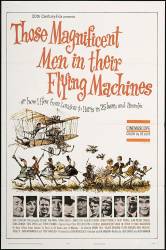Factual error: The "American" aircraft is really a British design called a Bristol Boxkite.

Those Magnificent Men in Their Flying Machines (1965)
Plot summary
Directed by: Ken Annakin
Starring: James Fox, Sarah Miles, Stuart Whitman, Alberto Sordi
In 1910, flying long distances is still both an untested experience and a new craze. Both for the glory of Britain and for the prestige and profit of his newspaper, the Daily Post, Lord Rawnsley sponsors an air race from London to Paris. Veteran flying pioneers from all over the northern hemisphere - England, France, Germany, the USA, Italy, and Japan - come together, and a lot of competition breaks out even before the race; Germans and French are locked in a (humorous) duel of nerves and national prestige, and the pilots Mays of England and Newton of the US vie for the affections of Rawnsley's free-spirited daughter Patricia.
And when the race finally begins, it is laced with all sorts of hilarious accidents which throw most of the compeditors out of the field. Of 14 contestants, only four actually reach Paris - but who is the winner...?
Suggested correction: Why is this an error? The "American" aircraft was fictional (there was no such thing as the "Phoenix Flyer") so they could have used anything to represent it. The design they used was known to work and was safe. The original Boxkite was actually a British version of The Farman and was similar in appearance the the American Curtiss.
The American pilot, while talking to the movie's heroine, states that his plane is a Curtiss. Check the scene in the restaurant, the night before he saves the German plane with the damaged tail. I tend to think the "Phoenix Flyer" was the name of that individual plane, and not the model of aircraft. That would mean that the pilot of the plane indirectly said that his plane was of American manufacture, as Curtiss was an American company.
Another interesting note is that in the scene with the runaway German plane, Orville Newton's plane is being wheeled out of the hangar, which has a "Bristol Company" sign over the doors. They "just happen" to be borrowing space in the hangar owned by the company that made the original Bristol Boxkites! It's a meaningless detail, but fun that they arranged it that way.
Count Emilio Ponticelli: It is a pity that the race will now be won by a Protestant.
Mother Superior: A Protestant? Sisters, don't stand there gazing. This good Catholic needs our help.
Trivia: The sequence where the aeroplane lands on a train was shot on the Bedford-Hitchin railway line, which was closed in 1964.
Join the mailing list
Separate from membership, this is to get updates about mistakes in recent releases. Addresses are not passed on to any third party, and are used solely for direct communication from this site. You can unsubscribe at any time.
Check out the mistake & trivia books, on Kindle and in paperback.



